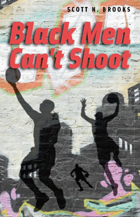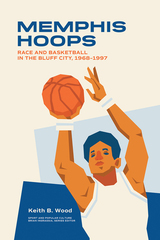
The myth of the natural black athlete is widespread, though it’s usually talked about only when a sports commentator or celebrity embarrasses himself by bringing it up in public. Those gaffes are swiftly decried as racist, but apart from their link to the long history of ugly racial stereotypes about black people—especially men—they are also harmful because they obscure very real, hard-fought accomplishments. As Black Men Can’t Shoot demonstrates, such successes on the basketball court don’t happen just because of natural gifts—instead, they grow out of the long, tough, and unpredictable process of becoming a known player.
Scott Norman Brooks spent four years coaching summer league basketball in Philadelphia. And what he saw, heard, and felt working with the young black men on his team tells us much about how some kids are able to make the extraordinary journey from the ghetto to the NCAA. He tells the story of two young men, Jermaine and Ray, following them through their high school years and chronicling their breakthroughs and frustrations on the court as well as their troubles at home. Black Men Can’t Shoot is a moving coming-of-age story that counters the belief that basketball only exploits kids and lures them into following empty dreams—and shows us that by playing ball, some of these young black men have already begun their education even before they get to college.

Memphis Hoops tells the story of basketball in Tennessee’s southwestern-most metropolis following the 1968 assassination of Martin Luther King Jr. Keith Brian Wood examines the city through the lens of the Memphis State University basketball team and its star player-turned-coach Larry Finch. Finch, a Memphis native and the first highly recruited black player signed by Memphis State, helped the team make the 1973 NCAA championship game in his senior year. In an era when colleges in the south began to integrate their basketball programs, the city of Memphis embraced its flagship university’s shift toward including black players. Wood interjects the forgotten narrative of LeMoyne-Owen’s (the city’s HBCU) 1975 NCAA Division III National Championship team as a critical piece to understanding this era. Finch was drafted by the Lakers following the 1973 NCAA championship but instead signed with the American Basketball Association’s Memphis Tams. After two years of playing professionally, Finch returned to the sidelines as a coach and would eventually become the head coach of the Memphis State Tigers.
Wood deftly weaves together basketball and Memphis’s fraught race relations during the post–civil rights era. While many Memphians viewed the 1973 Tigers’ championship run as representative of racial progress, Memphis as a whole continued to be deeply divided on other issues of race and civil rights. And while Finch was championed as a symbol of the healing power of basketball that helped counteract the city’s turbulence, many black players and coaches would discover that even its sports mirrored Memphis’s racial divide. Today, as another native son of Memphis, Penny Hardaway, has taken the reigns of the University of Memphis’s basketball program, Wood reflects on the question of progress in the city that saw King’s assassination little more than forty years ago.
In this important examination of sports and civil rights history, Wood summons social memory from an all-too-recent past to present the untold—and unfinished—story of basketball in the Bluff City.
READERS
Browse our collection.
PUBLISHERS
See BiblioVault's publisher services.
STUDENT SERVICES
Files for college accessibility offices.
UChicago Accessibility Resources
home | accessibility | search | about | contact us
BiblioVault ® 2001 - 2024
The University of Chicago Press









